Latest articles
12.06.2023
Plurensa-2023 : "Multilingualism/plurilingualism, teaching and learning, complexity and integrity: epistemological, pedagogical and political perspectives" (7-10 June 2023, Montpellier, France)
The Plurensa-2023 international conference organised at the Université Paul Valéry Montpellier France (7-10 June 2023) provided an opportunity for experts to meet and exchange views on the themes of "Multilingualism/plurilingualism, teaching and learning, complexity and integrity: epistemological, pedagogical and political perspectives". This exceptional event brought together many ECML experts from past and present projects and many researchers from all over the world, including Nathalie AUGER, Jean-Paul BRONCKART, Marisa CAVALLI, Jasone CENOZ, Jean-Louis CHISS, Daniel COSTE, Jim CUMMINS, Sabine EHRHART, Laurent GAJO, Fred GENESSEE, Ingrid GOGOLIN, Nancy HORNBERGER, Wei LI, Jeff MACSWAN, Georges Daniel VERONIQUE.
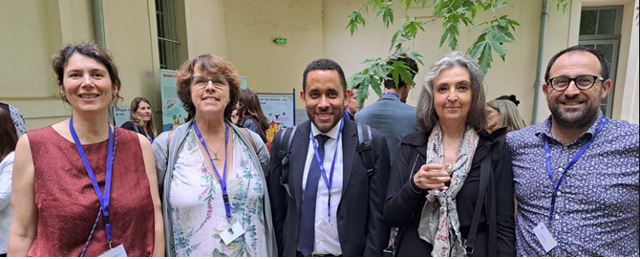
From left to right
Nathalie Auger, ECML project "Teaching the language of schooling in the context of diversity – Study materials for teacher development" (MALEDIVE) (2012-2015)
Sabine Erhart, ECML project "Enhancing language education in cross-border vocational education" (2020-2023)
Jonas Erin, "Learning environments where modern languages flourish - EOL" (2016-2019)
Marisa Cavalli, Consultant to the European Centre for Modern Languages of the Council of Europe
Jérôme Beliard, ECML project "Developing language awareness in subject classes" (2016-2019)
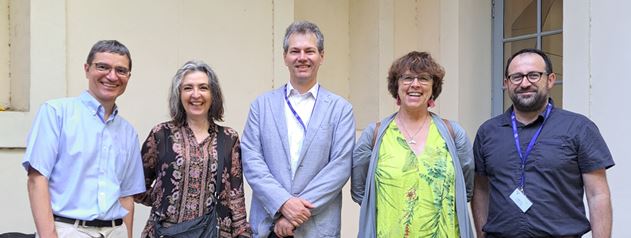
From left to right
Guillaume Gentil, Professor, Carleston Carleston
Marisa Cavalli, Consultant to the European Centre for Modern Languages of the Council of Europe
Jérémie Séror, Director of the Official Languages and Bilingualism Institute (OLBI) and Associate Dean of the Faculty of Arts, University of Ottawa
Sabine Erhart, ECML project "Enhancing language education in cross-border vocational education" (2020-2023)
Jérôme Beliard, ECML project "Developing language awareness in subject classes" (2016-2019)
16.12.2020
“Developing language awareness in subject classes”: new ECML resource website for teachers and teacher educators of non-linguistic subjects

The European Centre for Modern Languages (ECML) of the Council of Europe is pleased to announce the completion in both English and French of its resource website “Developing language awareness in subject classes” (www.ecml.at/languageinsubjects), an output of the ECML programme “Languages at the heart of learning” (2016-2019).
These new resources are for teachers and teacher educators of what are traditionally considered to be “non-linguistic” subjects such as maths, biology, physics or history. Given that the academic success of each learner depends to a large extent on his or her mastery of the language of schooling, additional support is needed so that the specific discourse used in different subject classes becomes more accessible, particularly to vulnerable learners, including those from a migrant background.
The practical resources on the website help teachers to identify the linguistic needs of their learners and to reflect on language-sensitive approaches which can be applied when learning new subject content. Teachers can explore different ways to support their students with writing, speaking, and reading tasks by drawing on students’ first language in their teaching and creating appropriate teaching materials. We believe that these pedagogical approaches are of particular importance in addressing some of the social and linguistic divides present in our schools, divides which Covid-19 has only increased.
“Developing language awareness in subject classes”
(www.ecml.at/languageinsubjects)
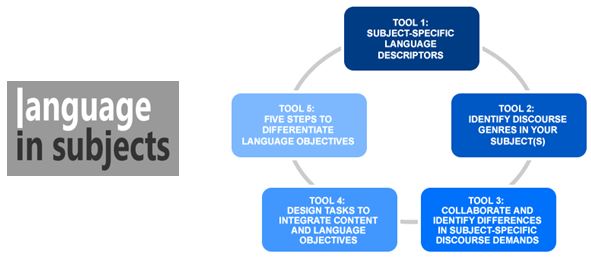
Click on the links below to go directly to the different resources:

06.06.2019
"Developing language awareness in subject classes": finalising the resource website
The project team had its last expert meeting 6-7 May in Graz. Since the February meeting, all the materials on the website "Developing language awareness in subject classes" have been re-checked and updated. So the main aim of the meeting was to see what was still missing and to distribute the responsibilities for delivering the last parts by the end of June. These parts include, for example, translations of the materials into French and examples of case studies conducted by subject teachers in different member states.
As disseminating the materials produced during the 4-year long project is now of utmost importance, the team is hoping to do so via training and consultancy events in ECML member states. These events would allow the team to promote the tools developed in different educational contexts - adapting training according to specific subject and learner needs.
The project team:
Marita Härmälä, (project coordinator), Artashes Barkhanajyan, Jérôme Béliard, Elie Moe
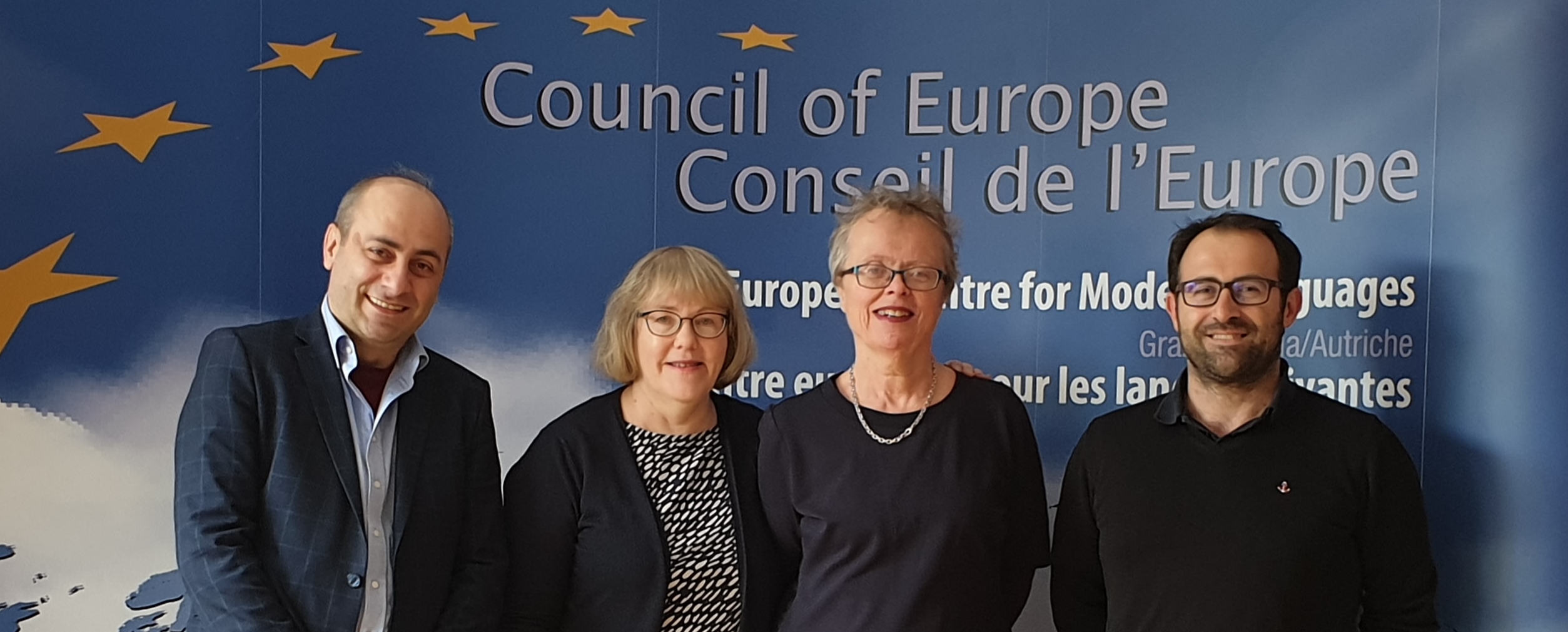
20.03.2019
“Developing language awareness in subject classes” – Final phase of results production (ECML, Graz, 4-8 February 2019)
The meeting was a great success allowing us to work efficiently and face-to-face for several days. On our agenda was the finalisation of materials that had been piloted by the network partners in several schools in Europe.
We produce a 3-step structure – Planning-Teaching-Learning – for the web presentation of the project results. The tools presented under this structure are practical procedures that will help to identify students’ language needs in subject learning. As an example, there will be a grid to be used by subject teachers to make them more aware of language use in their classes and to guide them in identifying aspects of language relevant for developing subject knowledge of the students.
Find out more about how subject teachers can identify the needs of their learners and to support them: www.ecml.at/languageinsubjects.
The project team:
Marita Härmälä, (project coordinator), Artashes Barkhanajyan, Jérôme Béliard, Elie Moe
05.11.2018
"Developing language awareness in subject classes": ECML project network meeting in Graz (18-19 October 2018)
The ECML project "Developing language awareness in subject classes" had a 2-day long network meeting in Graz 18-19 October 2018. It was preceded by a preparatory meeting for the team members where the aim was to finalize the materials for the upcoming meeting.
The network participants came from nine different countries. They represented various school subjects, such as history, biology, geography, mathematics, chemistry, physical education, and social sciences. The aim of the meeting was to get from the participants feedback on the first versions of the tools that the team had developed for subject teachers. With the help of the tools, subject teachers should become more aware of the language component in their subject to be able to scaffold those students who struggle with the subject-specific language. For example, in history, what does it mean to be able to produce a historical recount on different proficiency levels (A2, B1)? What are the different steps of the historical recount and what linguistic elements are necessary to compile the task?
The feedback from the participants was encouraging. The next step for the project team is to make the suggested modifications to the tools and, thereafter, give instructions to the network meeting participants to pilot the tools in their schools.
The project team:
Marita Härmälä, (project coordinator), Artashes Barkhanajyan, Jérôme Béliard, Elie Moe
18.10.2018
Networking on Language in subjects (Graz, 18-19 October 2018)
"Whatever the subject, all knowledge building in a school involves working with languages."
For the next two days the 5 team members of the ECML’s project “Developing language awareness in subject classes” will be working with 11 non-linguistic subject teachers of 12/13 year old students with migration background on the development of teaching approaches and materials, coming from Armenia, Austria, Finland, France, Iceland, Netherlands, Norway, Sweden and Switzerland.
The project aims to provide subject teachers with practical procedures to identify and support their learners. The procedures developed will enable teachers to reflect on different ways to include plurilingual and intercultural approaches in their teaching, approaches which learners can draw on and apply when learning new subject content. The initiative builds on the outputs of the ECML project "Language skills for successful subject learning - CEFR linked descriptors for mathematics and history/civics".
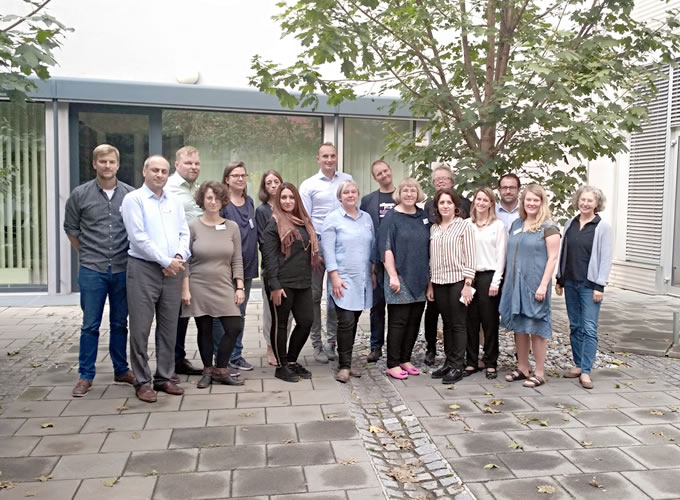
05.07.2018
Developing language awareness in subject classes: presentation at the 15th Annual Conference of EALTA (Bochum, Germany, 24 May 2018)
Raising awareness of the role of language in all learning: Marita Härmälä (Finnish Education Evaluation Centre) and Eli MOE (University of Bergen) gave a presentation at 15th Annual Conference of EALTA /7th CEFR SIG Meeting (programme).
Marita Härmälä and Eli Moe reported on an ongoing 4-year ECML project centered on the language of schooling. It builds on the results of the ECML Language Descriptors 2012-2015 project where subject specific CEFR descriptors were developed for young L2 learners in history and mathematics. The aim of the current project is to develop samples of teaching materials including both content and language goals.
13.06.2018
Just published : Courriel européen des langues – Issue no. 40, the e-magazine of the National Contact point for the ECML in France
The “Courriel européen des langues”, the online magazine which is edited twice a year by the International Centre for Pedagogical Studies (CIEP), has been relaunched with renewed contents and a refreshing layout. The current issue highlights 6 ongoing ECML projects, giving the floor to the project coordinators and a project team member, as well as to teachers in the field. In addition, the National Contact Point for the ECML highlights the new national language strategy in Denmark. Finally, a section presents 11 recent resources (online materials, publications).
The Courriel is disseminated in French on the CIEP website and on its LISEO portal (see dedicated section “Courriel européen des langues”). You can subscribe for free to the Magazine and find the archives here: http://www.ciep.fr/lettres-information/courriel-europeen-langues.
Contents of Issue no. 40 – May 2018 (only available in French):
Focus sur le projet EOL
- EOL – Des environnements d’apprentissage optimisés pour et par les langues
Article de Jonas ERIN, Inspecteur général de l’éducation nationale, coordinateur européen du projet EOL
- Témoignages
- Le projet EOL au collège André Chénier (Carcassonne)
Témoignage d’Émilie Courtejaire, avec la collaboration de Selvi Gras, professeur d’anglais et professeur d’espagnol au collège André Chénier, coordinatrice du projet EOL pour le collège
- Le projet EOL au lycée Les 7 Mares (Maurepas)
Témoignage de Noëlle Sédilot-Gasmi, Professeure d’espagnole et coordinatrice de la discipline, initiatrice et coordinatrice du projet EOL pour le lycée
Autres projets du CELV
- Le projet e-lang - Vers une littératie numérique pour l’enseignement et l’apprentissage des langues
Article de Christian Ollivier, Professeur des universités à l’université de La Réunion, coordinateur du projet e-lang
- La/les langue(s) de scolarisation : une feuille de route pour les établissements scolaires
Article de Rebecca DAHM, Maître de conférences en didactique des langues, ESPE Midi-Pyrénées – Université Toulouse-Jean Jaurès, coordinatrice du projet Langue(s) de scolarisation
- Le projet QualiMatrix dans sa dernière année de développement
Article de Gudrun ERICKSON, University of Gothenburg, Department of Education and Special Education, documentaliste du projet QualiMatrix
Actualités
- Développer la conscience linguistique dans les matières scolaires : appel à contribution pour les enseignants de DNL
- Vers un Cadre européen commun de référence pour les enseignants de langues : trois instruments à l’honneur en 2018
- La Gazette européenne des langues
L’enseignement des langues au Danemark
- Entretien avec Ana Kanareva-Dimitrovska, point de contact national du Danemark
Propos recueillis par Marion Latour et Bernadette Plumelle
Ressources
- À explorer sur internet
- Label européen des langues : EUROBAC
- Écrire en plusieurs langues : dossier réactualisé « Intégrer le numérique en classes de langues »
- Dossier thématique « La mémorisation : Dans quelle mesure le numérique permet-il de créer des situations d’apprentissage efficace ? »
- Audio Lingua : 5 000 fichiers audio en 13 langues
- Radio Garden : écouter en direct toutes les radios nationales, locales ou web du monde
- 7 nouveaux kits eTwinning pour monter un projet eTwinning
- Vient de paraître
08.05.2018
"Developing language awareness in subject classes": join the network of the European Centre for Modern Languages/Council of Europe!
Are you a secondary school teacher of a non-linguistic subject (other than mathematics or history) working in a linguistically and culturally diverse school? Do you teach 12/13 year olds whose first language is different from the language of schooling? Are you interested in sharing your subject expertise and exchanging experiences with European professionals in the field of language in subject teaching? Then this project is for you!
As a subject teacher you will gain a deeper understanding of the role that language plays in knowledge building. And you will be better equipped to respond to linguistic diversity in your classroom and to support students whose first language is different from the language of schooling.
For registration and more information please contact Marita Härmälä, project coordinator.
04.05.2018
Developing language awareness in subject classes: language challenges for subject teachers in Finland
The Finnish National Agency for Education and the Finnish Education Evaluation Centre organised a half-day workshop for subject teachers of history and mathematics in connection with the ECML’s Language in subjects project. In total 28 teachers, school administrators and other professionals working with 12/13-year-old students participated.
The purpose of the workshop was to discuss the language challenges teachers encounter in their classes and to give teachers of different subjects concrete tools to design language aware teaching.
The participants’ feedback showed that subject teachers need training and examples of good practices to be able to better take into account students with learning difficulties caused by insufficient skills in the language of schooling. The issues raised will be further discussed in the network meeting Language in subjects organised in October 2018 in Graz.
Marita Härmälä,
coordinator of the ECML project "Language in subjects"
14.03.2018
ECML project on “Developing language awareness in subject classes”: invitation for subject teachers
During the meeting on 8-9 February 2018 in Graz the coordination team members decided on the layout and content of a new online resources platform. All teaching materials produced in the course of this project will be freely accessible online and include e.g.
- tips on how to define the language goals of a subject lesson;
- examples of scaffolding techniques to bridge the gap between everyday language (BICS) and academic language (CALP); as well as
- self-assessment grids for teachers and students.
The team also defined the profile of participants of the forthcoming network meeting on 18-19 October 2018. Teachers who have agreed to pilot the project materials in schools will feedback on their experiences.
Are you a subject teacher of 12/13 year old students with migration background and have an interest in collaborating with a European team in the development of teaching materials? If you are interested to participate, please contact Marita Härmälä, project coordinator (marita.harmala@karvi.fi) for more information on how to get involved. The working languages of the network meeting will be English and French. If you are invited to the meeting, the European Centre for Modern Languages of the Council of Europe will cover your travel and subsistence costs.
Marita Härmälä, project coordinator
12.02.2018
Intense and fruitful exchange of ideas on future developments in language education
The 2-day meeting (6-7 February 2018) at the ECML in Graz, Austria, was an excellent opportunity for the ECML project experts to discuss ongoing project developments with their fellow project coordinators.
They explored synergies between the different projects and exchanged good practice in project methodology. They discussed ongoing work on the development of their products and how to best disseminate the wide range of final results which will be achieved by the end of 2018 and 2019. They reflected on critical success factors to promote the achievements across and at the end of their respective project life cycles, to implement, to mediate, to possibly further develop them and to maximise impact in the various national and individual contexts. Finally they shared initial ideas for both the contents and the structure of the next ECML programme (2020-2023). They also highlighted the added value, both professional and personal, of coordinating ECML projects, seeing this as an opportunity to bridge policy, research and practice and contribute to making a real difference to quality language education in Europe.
Impressions of the meeting (photo gallery on Facebook)
Current ECML programme of activities 2016-2019: "Languages at the heart of learning"
12.01.2018
Developing language awareness in subject classes: overview 2017
The year 2017 was a very busy and important year for the project. First, we sent out our online questionnaire at the beginning of year. By September, we had received some 230 answers, which we are now summarizing.
The second big event was the workshop, which was held in October. It gathered 38 experts from 34 different countries, and as a result gave us examples of lessons plans for different subjects. The main aims for the year 2018 are to pilot these lesson plans and to start building-up the website with examples of teaching materials.
Project website
20.12.2017
Project workshop "Developing language awareness in subject classes" (Graz, Austria, 16-17 November 2017): workshop report
The workshop for the project "Developing language awareness in subject classes" took place at Graz on 16-17 November 2017. The workshop was one of the key events in the life of the whole project and the expectations for its outcomes were high both among the project team as well as the participants.
38 experts from 34 different countries participated in the event; two of them came from as far as Canada. The group participants had mixed background; as one of the aims of the workshop was to encourage cooperation between teachers and other experts, it included subject teachers, language teachers, and teacher trainers.
As a pre-task, the participants were asked to plan a subject lesson for a class of 12/13 old students including students from migrant backgrounds. The pre-task allowed for the participants to start focusing and reflecting on the main theme of the workshop: how to scaffold students with weak skills in the language of schooling.
During the workshop, the participants were given two group work tasks. First, they were asked to plan a subject lesson with clearly defined content and language goals. Second, they were asked to give concrete examples of how to scaffold the students with weak language skills and to state what language objectives can be set for students with different proficiency levels (e.g. at the CEFR level A2 vs. B1).
The workshop was limited to focusing on a relatively small range of methods due to time constraints and did not cover all possibilities for supporting the language of schooling.
Each group worked with extreme dedication and had vivid discussions on how to approach the tasks. The workshop allowed for the participants to network and to get new ideas on how to raise awareness of the role that language has in all knowledge building. The next step will be the network meeting in October 2018, where the results e.g. of the first lesson plan pilots will be discussed and worked on further.
The project team:
Marita Härmälä (coordinatrice du projet), Artashes Barkhanajyan, Jérôme Béliard, Eli Moe
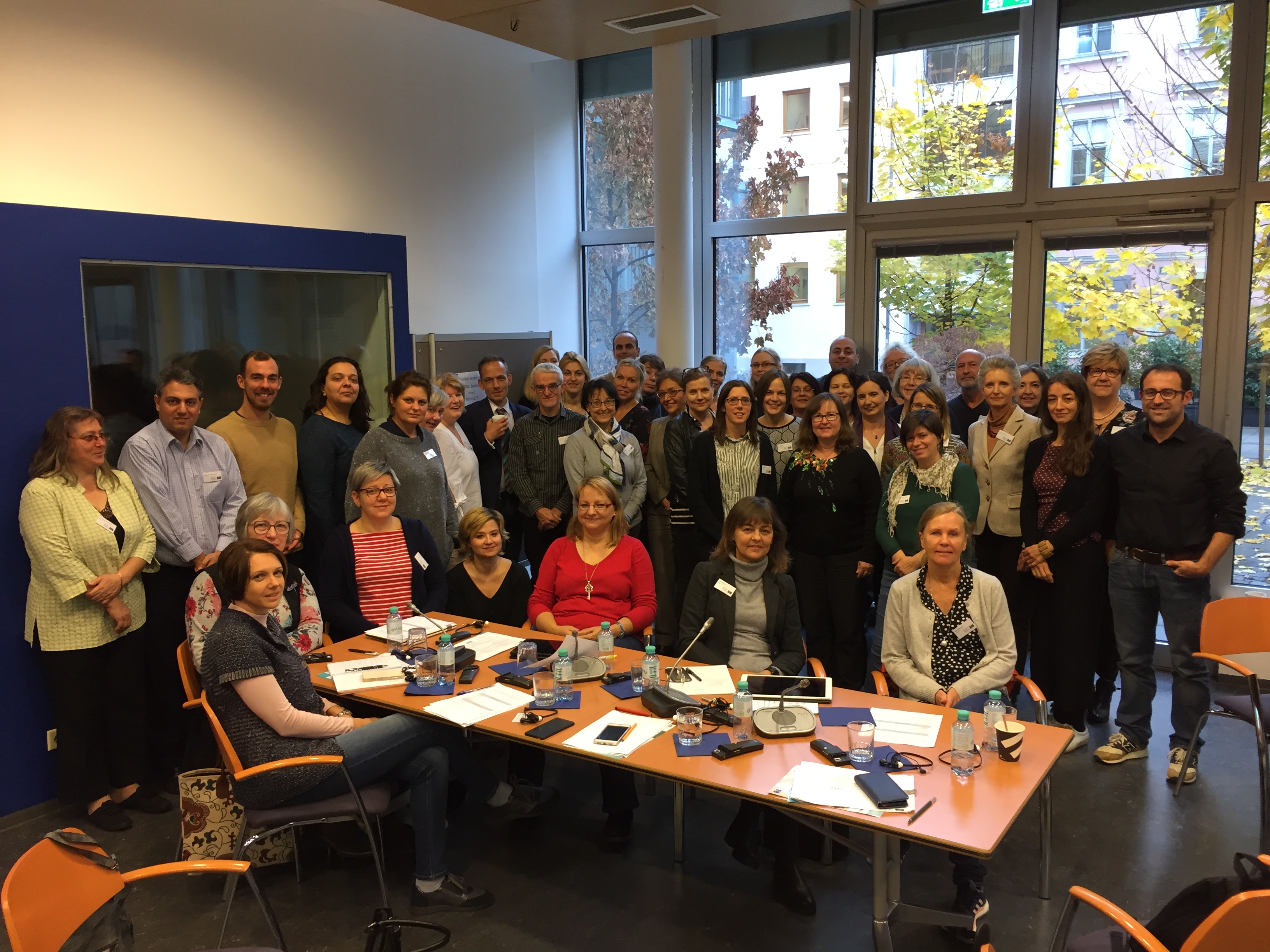
18.12.2017
Q & A with Bac faculty member selected to represent Canada in discussions for developing language awareness
02.10.2017
Call for participants: ECML Workshop 4/2017 "Developing language awareness in subject classes" (16-17 November 2017, ECML, Graz, Austria)
In preparation for the workshop, the national representatives from the 33 ECML member states are currently selecting potential participants for the workshop "Developing language awareness in subject classes" (16-17 November 2017, ECML, Graz, Austria). Experts from Finland, Liechtenstein and Lithuania, with a special interest and relevant professional background in this topic, are still warmly invited to make contact with the ECML National Nominating Authority in their country so that they can be considered for participation in this project workshop.
The expert team is very excited about the event and greatly looking forward to working with colleagues from all around Europe !
05.05.2017
Recently published: European Language Gazette no. 36 (January-April 2017)
The European Language Gazette, the ECML's e-newsletter, provides up-to-date news about the ECML (events, projects, resources), the Language Policy Unit and other relevant sectors of the Council of Europe, as well as our partners. It focuses on national developments in the field of language education in the member states and beyond.
Read the latest issue: English - French
*****
Issue no. 36 – Contents
Focus on ECML programme developments – "Languages at the heart of learning" (2016-2019)
Latest project developments
"Language awareness in subject classes": participate in an online survey
"Towards a Common European Framework for Language Teachers": latest news
e-lang project in 2016: laying the foundations for a digital literacy in the language teaching and learning context
"Promoting excellence in sign language instruction (PRO-Sign2)": ECML workshop (Graz, Austria, 1-2 March 2017) – cooperation partnership with Moscow State Linguistic University
"A quality matrix for CEFR use": ECML workshop (Graz, Austria, 15-16 November 2016) – Interview with Denis Vigneron, French participant
ECML training and consultancy for member states
Network meeting of local organisers and ECML consultants (Graz, Austria, 7-8 March 2017) and upcoming national training workshops
National training workshop "Supporting multilingual classes" in Slovenia (Koper, 2-3 March 2017)
National workshops "A pluriliteracies approach to teaching for learning" in Malta (Floriana, 2-3 March 2017) and Latvia (Riga, 6-7 March 2017)
Forthcoming events
Recent ECML publication: Language skills for successful subject learning – CEFR linked descriptors for mathematics and history/civics
European Day of Languages
National developments in Armenia, Austria, Canada, France, Germany, Luxembourg, Malta, Poland, Slovenia, Switzerland
Professional Network Forum of the ECML: upcoming events
Council of Europe developments
The linguistic integration of adult migrants: some lessons from research
Council of Europe Ad hoc Committee of Experts on Roma and Traveller Issues (CAHROM) (ECML, Graz, Austria, 29-31 March 2017)
International Roma Day – 8 April
Pestalozzi programme: creating an online community of action researchers – summer school 2017
Framework Convention for the Protection of National Minorities: developments in Albania, Armenia, Azerbaijan, Bosnia and Herzegovina, Finland, Kosovo*, Lithuania, Moldova, Montenegro, Norway, Romania, Russian Federation, Slovenia, Sweden, Switzerland, Ukraine, United Kingdom, "The former Yugoslav Republic of Macedonia"
Urban policies for inclusive integration and diversity advantage: join the Intercultural Cities 2017 Milestone Event (Lisbon, Portugal, 28-29 November 2017)
Cyprus Chairmanship Conference in Nicosia: "Securing Democracy through Education"
Recent publication
Editorial news from other organisations: Eurostat, Eurydice, OECD, Unesco, Mercator European Research Centre on Multilingualism and Language Learning, Babylonia
Quick links
27.03.2017
ECML online questionnaire "Language in subjects"
This online questionnaire is part of an ECML project called "Developing language awareness in subject classes". It targets subject teachers (mathematics, history, science, physical education etc.) and teacher trainers who
- are experienced in teaching students at the age of 12/13 with a different language background, and/or
- take an interest in developing their students’ academic, subject specific language.
The questionnaire is available in five different languages (English, French, Armenian, Finnish, Norwegian). It takes approximately 15 minutes to answer it. It will be online until the 31 July. It will be followed by a 2-day workshop on 16-17 November 2017 in Graz. If you are interested in participating, please contact your national nominating authority. The results of the questionnaire will be available on the project website from December 2017.
We would be grateful if you could answer this questionnaire yourself and/or disseminate the questionnaire among your networks as appropriate. Thank you in advance for your cooperation!
05.01.2017
Just published: European Language Gazette no. 35 (December 2016)
The ECML's e-newsletter provides up-to-date news about the ECML (events, projects, resources), its partners and other relevant sectors of the Council of Europe. It focuses on language education and national developments in the member states and beyond.
Enjoy the latest issue (December 2016) : English - French
20.06.2016
Developing language awareness in subject classes - launch of new ECML project
‘Every teacher is a language teacher’ is one of the central ideas of the project ‘Developing language awareness in subject classes’. The project aims at promoting the importance of language skills across school subjects by raising subject teachers’ awareness of the role that language plays in all knowledge building. Of special interest are 12/13 -year old students who may because of, for example, a migration background, struggle with language in subject classes. The project has a very concrete aim: it will design samples of teaching materials for different subject classes. This material will enable teachers, first, to diagnose the language problems their students have, and second, to support these students in terms of language. In addition, different ways to draw on students’ multilingual and multicultural repertoires will be explored.
'Developing language awareness in subject classes’ is based on the Language Descriptors –project (www.ecml.at/languagedescriptors), which set out to develop CEFR-based language descriptors for mathematics and history/civics for two ages groups: 12/13- and 15/16-year old students. The findings of the Language Descriptors-project indicate that 12/13-year old students will need at least B1 level skills to reach competence goals in history/mathematics.
The project team had its first meeting in Graz at the beginning of February 2016. During two busy working days the team planned the 2016-2017 timetable and started collecting ideas for a questionnaire, which will be sent subject teachers, meaning teachers of history, mathematics, and music or arts. The questionnaire focuses on gathering information on the teaching practices that the teachers already use to identify and support their L2 students with language problems. The first version of the questionnaire will be piloted in autumn 2016 through face-to-face interviews, which the team members conduct in their respective countries (Finland, Norway, France, Armenia). After this first phase, the team will be able to finalise the questions and send out an online version to a wider audience.
By late 2016, the team will have the first results, which will then guide the first workshop in autumn 2017. This workshop will support the drafting of the first samples of the concrete teaching materials.